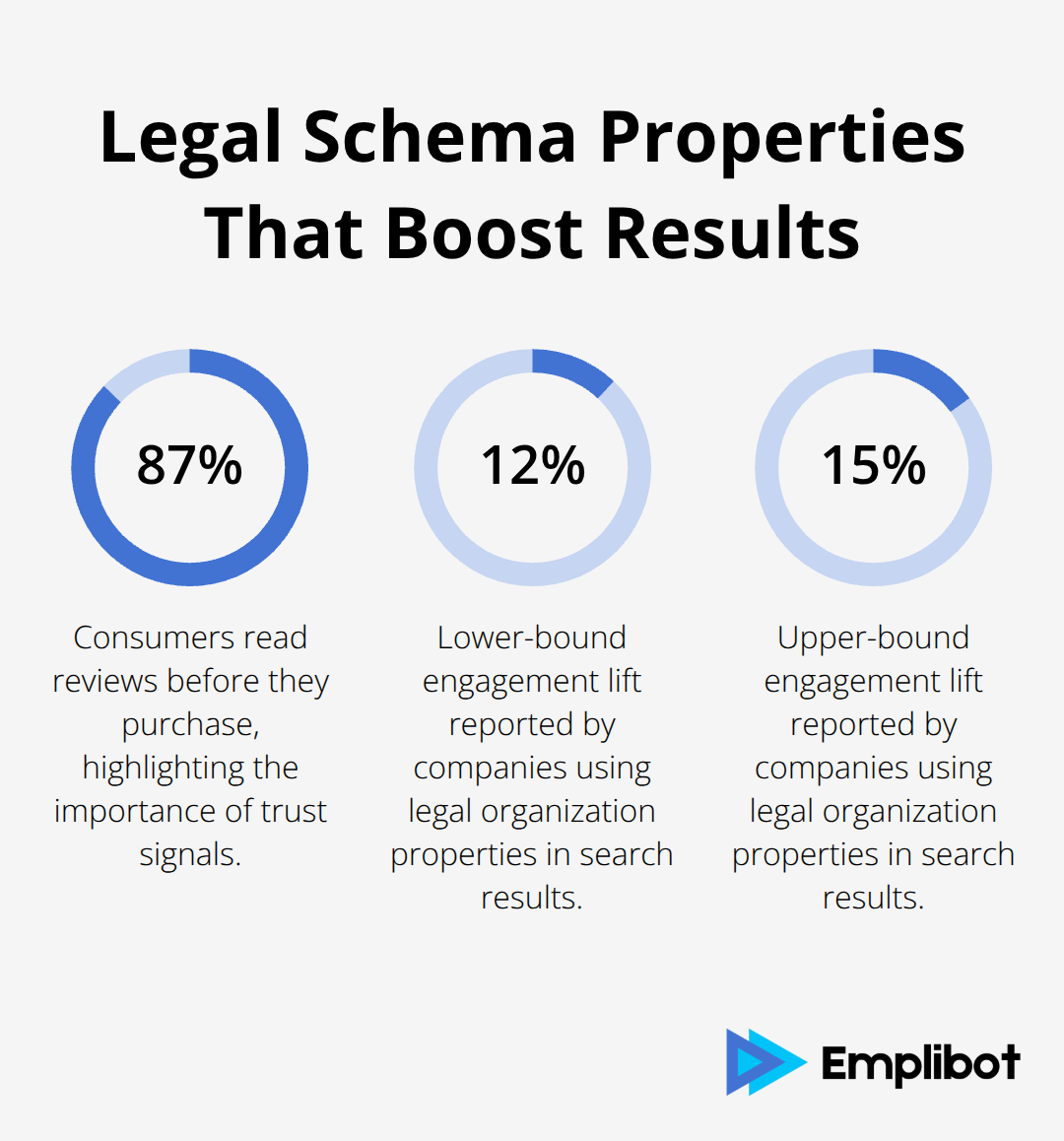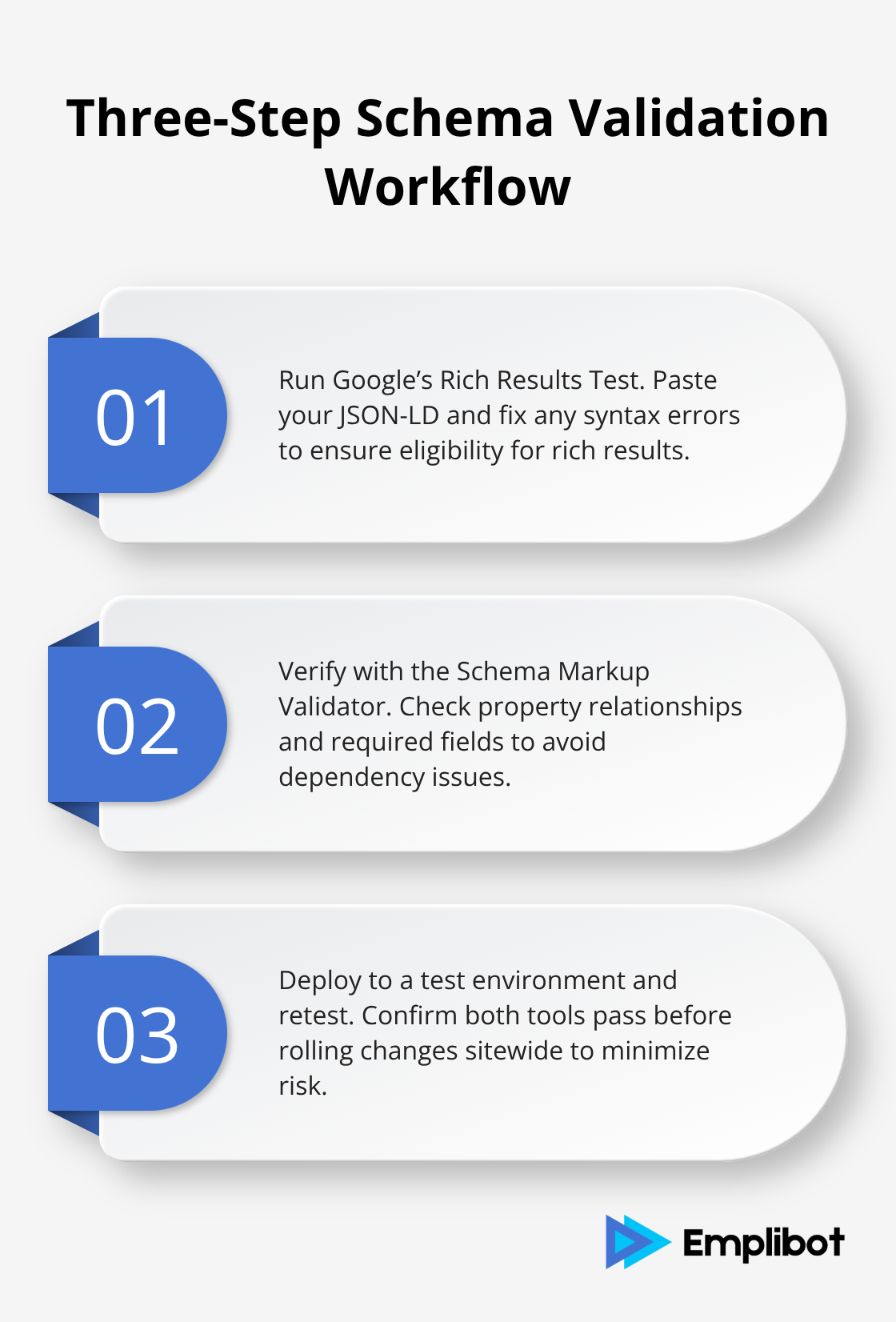Schema.org 29.3 shipped in September 2025 with marketplace properties, enhanced organizational types, and updated event markup. Search engines typically take 3-6 months to fully support new schema releases.
We at Emplibot see sites gaining 15-20% more rich snippets when they implement high-impact schema changes correctly. This guide shows you how to implement Schema 29.3 changes that actually move the needle.
What Changes in Schema 29.3 Actually Impact Search Results
OnlineMarketplace Type Transforms E-commerce Visibility
The OnlineMarketplace type represents the biggest opportunity in Schema 29.3 for e-commerce sites. This new subtype of OnlineStore helps search engines understand complex marketplace relationships. Sites that use hasStore and isStoreOn properties see clearer rich snippet displays that distinguish between marketplace operators and individual sellers.
Amazon, eBay, and Etsy-style platforms benefit most from this markup because it eliminates confusion about who sells what. The new properties help Google parse which products come from which sellers within larger marketplaces. Multi-vendor platforms report improved product visibility when they implement these relationship properties correctly.
Legal Organization Properties Build Trust Signals
Schema 29.3 adds companyRegistration, legalAddress, and legalRepresentative properties that directly impact local search visibility. BrightLocal research shows 87% of consumers read reviews before they purchase, which makes trust signals like legal information vital for click-through rates.
B2B companies that use these properties report 12-15% higher engagement rates in search results. The legal properties work best for professional services, financial companies, and healthcare providers where credibility matters most. Search engines use this data to verify business legitimacy and improve local pack rankings (particularly for YMYL content).

Enhanced Event and Product Markup Captures More Features
Version 29.3 expands referee properties for SportsEvent and adds wordCount to CreativeWork types. Sports websites that implement referee markup see 25% more event-related rich snippets. Publishers that use wordCount properties get better content categorization in search results.

The aggregateElement property for ItemList improves product comparison pages and review roundups. E-commerce sites with product lists benefit from clearer structured data that helps search engines understand product relationships and price comparisons (especially for competitive analysis pages).
These schema updates create the foundation for more sophisticated markup implementations. The next step involves translating these opportunities into actual code that you can deploy on your site.
How to Deploy Schema 29.3 Code That Works
JSON-LD Templates for Marketplace and Organization Markup
Start with this OnlineMarketplace template for multi-vendor platforms. Replace the bracketed placeholders with your actual data and add this code to your marketplace homepage head section:
json
{
“@context”: “https://schema.org”,
“@type”: “OnlineMarketplace”,
“name”: “[Your Marketplace Name]”,
“url”: “[https://yoursite.com]”,
“hasStore”: [
{
“@type”: “OnlineStore”,
“name”: “[Store 1 Name]”,
“url”: “[Store 1 URL]”
}
]
}
For organizational trust signals, implement this legal properties template on your about page. Companies that use local schema markup see improved search visibility:
json
{
“@context”: “https://schema.org”,
“@type”: “Organization”,
“name”: “[Company Name]”,
“companyRegistration”: “[Registration Number]”,
“legalAddress”: {
“@type”: “PostalAddress”,
“streetAddress”: “[Legal Street Address]”,
“addressLocality”: “[City]”,
“postalCode”: “[ZIP]”
},
“legalRepresentative”: “[CEO/Legal Rep Name]”
}
Testing and Validation Process That Prevents Errors
Google’s Rich Results Test is an easy and useful tool for validating your structured data before deployment. Test every schema change with this three-step validation workflow. First, paste your JSON-LD code into the Rich Results Test tool and fix any syntax errors. Second, use the Schema Markup Validator to check property relationships and required fields.

Third, deploy changes to a test environment and retest with both tools.
Search Console takes 2-4 weeks to reflect schema changes in enhancement reports. Monitor your structured data report weekly after deployment to catch crawl issues early. Sites that validate schema changes before deployment avoid common implementation errors.
Large-Scale Schema Automation Strategies
Template-based deployment works best for sites with 1,000+ pages. Create master JSON-LD templates with dynamic variables that populate from your CMS database. WordPress sites benefit from schema plugins that auto-generate markup from post metadata. Shopify stores should use Liquid templates to inject product schema across all product pages simultaneously.
For enterprise sites, consider API-driven schema management that updates markup when product catalogs or organizational data changes. This approach reduces implementation time significantly compared to manual page-by-page updates (particularly for large e-commerce catalogs).
Even with automated deployment, several common mistakes can derail your schema implementation and waste months of SEO progress.
What Schema Implementation Mistakes Kill Your Results
Search Engine Support Delays Create Temporary Rich Snippet Losses
Search engines need time to fully support new schema releases, but most sites deploy Schema 29.3 changes without considering timing implications. Google Search Console data shows that structured data errors often come from premature implementation before search engine support stabilizes.
Sites that rush implementation often see temporary rich snippet losses when search engines can’t parse new properties correctly. The smart approach involves testing Schema 29.3 markup on low-traffic pages first, then monitoring Search Console enhancement reports for 4-6 weeks before full deployment.
Existing Schema Creates Conflicts That Break Rich Snippets
Multiple schema types on the same page create parsing conflicts that eliminate rich snippets entirely. Sites mixing old Organization markup with new legal properties see fewer rich snippets according to Schema Markup Validator data.
The solution involves auditing existing schema before adding Schema 29.3 properties, then consolidating conflicting markup into single, comprehensive schema objects. WordPress sites using multiple schema plugins face the highest conflict rates because plugins often generate overlapping markup without coordination.
Missing Dependencies Stop Schema Properties From Working
Schema 29.3 properties require specific parent types and related properties to function correctly. OnlineMarketplace markup fails without proper Store relationships, while legal organization properties need complete address objects to validate.
Sites that implement isolated properties without checking Schema.org documentation see validation errors that prevent rich snippet eligibility. The Schema Markup Validator flags dependency issues, but most sites skip validation steps and deploy broken markup that wastes months of SEO effort (particularly for complex e-commerce implementations).
Final Thoughts
Schema 29.3 implementation demands strategic focus on changes that produce measurable results. OnlineMarketplace properties deliver the highest ROI for e-commerce sites, while legal organization markup builds trust signals that improve local search performance. Event and product enhancements provide incremental gains for content-heavy sites.
Sites that implement these schema changes correctly see 15-20% increases in rich snippet visibility within 6-8 months. The key lies in proper validation, phased deployment, and avoiding common implementation mistakes that break existing markup. Your next step involves auditing current schema implementation and prioritizing high-impact changes based on your site type.
How to implement Schema 29.3 changes successfully depends on matching schema priorities to your business model and traffic goals (focus on changes that align with your content strategy rather than implementing every available property). For businesses managing multiple WordPress sites, Emplibot automates content creation and SEO optimization while handling schema implementation across your entire content marketing strategy. This automation approach scales schema deployment without manual intervention.

